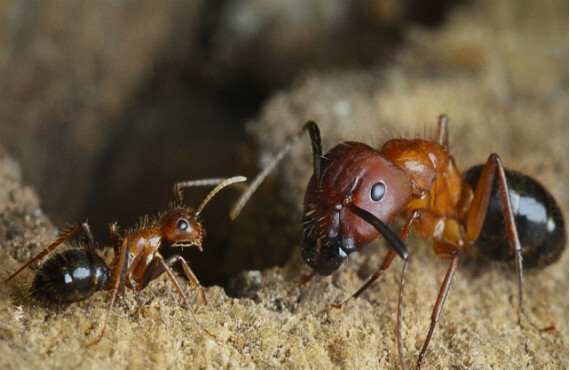Penn-led Team Reprograms Social Behavior in Carpenter Ants Using Epigenetic Drugs
In Florida carpenter ant colonies, distinct worker castes called minors and majors exhibit pronounced differences in social behavior throughout their lives. In a new study published today in Science, a multi-institution team anchored at University of Pennsylvania found that these caste-specific behaviors are not set in stone. Rather, this pioneering study shows that social behavior can be reprogrammed, indicating that an individual’s epigenetic, not genetic, makeup determines behavior in ant colonies.
Epigenetics is the study of stable, or persistent, changes in gene expression that occur without changes in DNA sequence. Epigenetic regulation has been observed to affect a variety of distinct traits in animals, including body size, aging, and behavior. However, there is an enormous gap in knowledge about the epigenetic mechanisms that regulate social behavior.
Ants provide ideal models to study social behavior, because each colony is comprised of thousands of individual sisters -- famously, the queen and all workers are female -- with nearly identical genetic makeup, much like human twins. However, these sisters possess stereotypically distinct physical traits and behaviors based on caste.
In a previous study, the authors created the first genome-wide epigenetic maps in ants. This revealed that epigenetic regulation is key to distinguishing majors as the “brawny” soldiers of carpenter ant colonies, compared to minors, their smaller, “brainier” sisters. Major ants have large heads and powerful mandibles that help to defeat enemies and process and transport large food items. Minor ants are much smaller, outnumber majors two to one, and assume the important responsibility of searching for food and recruiting other ants to help with the harvest. Compared to majors, these foraging minors have genes involved in brain development and neurotransmission that are over expressed.
In the new findings, an interdisciplinary research team led by senior author Shelley Berger, PhD, from the Perelman School of Medicine at the University of Pennsylvania, in collaboration with teams led by Juergen Liebig from Arizona State University and Danny Reinberg from New York University, found that caste-specific foraging behavior can be directly altered, by changing the balance of epigenetic chemicals called acetyl groups attached to histone protein complexes, around which DNA strands are wrapped in a cell nucleus. To reveal this exquisite control, the team demonstrated that foraging behavior could be reprogrammed using compounds that inhibit the addition or removal of these acetyl groups on histones (histone acetylation), in turn changing the expression of nearby genes.
Berger is the Daniel S. Och University Professor in the Departments of Cell & Developmental Biology, Biology, and Genetics. She is also the director of the Penn Epigenetics Program.
“The results suggest that behavioral malleability in ants, and likely other animals, may be regulated in an epigenetic manner via histone modification,” said lead author Daniel F. Simola, PhD, a postdoctoral researcher in the Penn Department of Cell and Developmental Biology. Simola is co-lead author with Riley Graham, a doctoral student in the Berger lab.
The almost decade-long collaboration between the Berger, Liebig, and Reinberg labs, supported by the Howard Hughes Medical Institute, blends molecular biology with observations of animal behavior to understand how caste-based differences arise in ants.
Ants, as well as termites, and some bees and wasps, are eusocial (or “truly social”) species. Previous work suggested that histone acetylation could create dramatic differences in gene expression between genetically identical individuals, contributing to the physical differences in body size and reproductive ability between ant castes.
Read the full release here.








